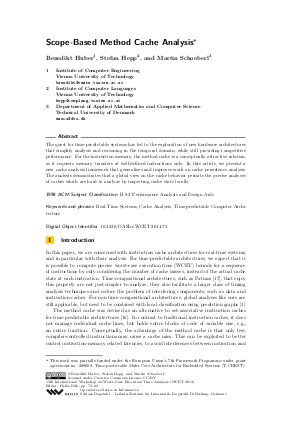Scope-Based Method Cache Analysis
Authors Benedikt Huber, Stefan Hepp, Martin Schoeberl
-
Part of:
Volume:
14th International Workshop on Worst-Case Execution Time Analysis (WCET 2014)
Part of: Series: Open Access Series in Informatics (OASIcs)
Part of: Conference: Workshop on Worst-Case Execution Time Analysis (WCET) - License:
 Creative Commons Attribution 3.0 Unported license
Creative Commons Attribution 3.0 Unported license
- Publication Date: 2014-07-08
File

PDF
OASIcs.WCET.2014.73.pdf
- Filesize: 496 kB
- 10 pages
Document Identifiers
Subject Classification
Keywords
- Real-Time Systems
- Cache Analysis
- Time-predictable Computer Architecture
Metrics
- Access Statistics
-
Total Accesses (updated on a weekly basis)
0PDF Downloads0Metadata Views
Abstract
The quest for time-predictable systems has led to the exploration of new hardware architectures that simplify analysis and reasoning in the temporal domain, while still providing competitive performance. For the instruction memory, the method cache is a conceptually attractive solution, as it requests memory transfers at well-defined instructions only. In this article, we present a new cache analysis framework that generalizes and improves work on cache persistence analysis. The analysis demonstrates that a global view on the cache behavior permits the precise analyses of caches which are hard to analyze by inspecting cache state locally.
Cite As Get BibTex
Benedikt Huber, Stefan Hepp, and Martin Schoeberl. Scope-Based Method Cache Analysis. In 14th International Workshop on Worst-Case Execution Time Analysis. Open Access Series in Informatics (OASIcs), Volume 39, pp. 73-82, Schloss Dagstuhl – Leibniz-Zentrum für Informatik (2014)
https://doi.org/10.4230/OASIcs.WCET.2014.73
BibTex
@InProceedings{huber_et_al:OASIcs.WCET.2014.73,
author = {Huber, Benedikt and Hepp, Stefan and Schoeberl, Martin},
title = {{Scope-Based Method Cache Analysis}},
booktitle = {14th International Workshop on Worst-Case Execution Time Analysis},
pages = {73--82},
series = {Open Access Series in Informatics (OASIcs)},
ISBN = {978-3-939897-69-9},
ISSN = {2190-6807},
year = {2014},
volume = {39},
editor = {Falk, Heiko},
publisher = {Schloss Dagstuhl -- Leibniz-Zentrum f{\"u}r Informatik},
address = {Dagstuhl, Germany},
URL = {https://drops.dagstuhl.de/entities/document/10.4230/OASIcs.WCET.2014.73},
URN = {urn:nbn:de:0030-drops-46066},
doi = {10.4230/OASIcs.WCET.2014.73},
annote = {Keywords: Real-Time Systems, Cache Analysis, Time-predictable Computer Architecture}
}
Author Details
References
-
Christoph Cullmann. Cache persistence analysis: Theory and practice. ACM Transactions on Embedded Computer Systems, 12(1s):40, 2013.

-
Philipp Degasperi, Stefan Hepp, Wolfgang Puffitsch, and Martin Schoeberl. A method cache for Patmos. In to appear: Proceedings of the 17th IEEE Symposium on Object/Component/Service-oriented Real-time Distributed Computing (ISORC 2014), Reno, Nevada, USA, June 2014. IEEE.

-
Daniel Grund and Jan Reineke. Abstract interpretation of FIFO replacement. In Proceedings of the 16th International Symposium on Static Analysis, SAS'09, pages 120-136, Berlin, Heidelberg, 2009. Springer-Verlag.

-
Daniel Grund and Jan Reineke. Precise and efficient FIFO-replacement analysis based on static phase detection. In Proceedings of the 2010 22nd Euromicro Conference on Real-Time Systems, ECRTS'10, pages 155-164, 2010.

-
Nan Guan, Xinping Yang, Mingsong Lv, and Wang Yi. Fifo cache analysis for wcet estimation: A quantitative approach. In Proceedings of the Conference on Design, Automation and Test in Europe, DATE'13, pages 296-301, San Jose, CA, USA, 2013. EDA Consortium.

-
Jan Gustafsson, Adam Betts, Andreas Ermedahl, and Björn Lisper. The Mälardalen WCET benchmarks - past, present and future. In Proceedings of the 10th International Workshop on Worst-Case Execution Time Analysis, July 2010.

-
Benedikt Huber, Wolfgang Puffitsch, and Peter Puschner. Towards an open timing analysis platform. In 11th International Workshop on Worst-Case Execution Time Analysis, July 2011.

-
Benedikt Huber and Martin Schoeberl. Comparison of implicit path enumeration and model checking based WCET analysis. In Proceedings of the 9th International Workshop on Worst-Case Execution Time (WCET) Analysis, pages 23-34, Dublin, Ireland, July 2009. OCG.

-
Bach Khoa Huynh, Lei Ju, and Abhik Roychoudhury. Scope-aware data cache analysis for WCET estimation. In IEEE Real-Time and Embedded Technology and Applications Symposium, pages 203-212, 2011.

-
Edgar Lakis and Martin Schoeberl. An SDRAM controller for real-time systems. In Proceedings of the 9th Workshop on Software Technologies for Embedded and Ubiquitous Systems, 2013.

-
Stefan Metzlaff and Theo Ungerer. Impact of instruction cache and different instruction scratchpads on the wcet estimate. In High Performance Computing and Communication 2012 IEEE 9th International Conference on Embedded Software and Systems (HPCC-ICESS), 2012 IEEE 14th International Conference on, pages 1442 -1449, june 2012.

-
Stefan Metzlaff and Theo Ungerer. A comparison of instruction memories from the WCET perspective. Journal of Systems Architecture, 60(5):452-466, 2013.

-
Fadia Nemer, Hugues Cassé, Pascal Sainrat, Jean Paul Bahsoun, and Marianne De Michiel. PapaBench: a free real-time benchmark. In Proceedings of 6th International Workshop on Worst-Case Execution Time Analysis (WCET), 2006.

-
Peter Puschner, Daniel Prokesch, Benedikt Huber, Jens Knoop, Stefan Hepp, and Gernot Gebhard. The T-CREST approach of compiler and WCET-analysis integration. In 9th Workshop on Software Technologies for Future Embedded and Ubiquitious Systems (SEUS 2013), pages 33-40, 2013.

-
Jan Reineke and Daniel Grund. Relative competitive analysis of cache replacement policies. In Proceedings of the 2008 ACM SIGPLAN-SIGBED conference on Languages, compilers, and tools for embedded systems, LCTES'08, pages 51-60, 2008.

-
Martin Schoeberl. A time predictable instruction cache for a Java processor. In On the Move to Meaningful Internet Systems 2004: Workshop on Java Technologies for Real-Time and Embedded Systems (JTRES 2004), volume 3292 of LNCS, pages 371-382, Agia Napa, Cyprus, October 2004. Springer.

-
Martin Schoeberl, Pascal Schleuniger, Wolfgang Puffitsch, Florian Brandner, Christian W. Probst, Sven Karlsson, and Tommy Thorn. Towards a time-predictable dual-issue microprocessor: The Patmos approach. In First Workshop on Bringing Theory to Practice: Predictability and Performance in Embedded Systems (PPES 2011), pages 11-20, Grenoble, France, March 2011.

-
Henrik Theiling, Christian Ferdinand, and Reinhard Wilhelm. Fast and precise WCET prediction by separated cache and path analyses. Real-Time Systems, 18(2/3):157-179, 2000.

